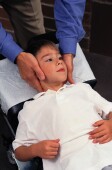
WEDNESDAY, Feb. 15 (HealthDay News) — Researchers report that they’ve discovered the importance of a particular gene in kicking off puberty in humans, a finding that offers insight into how the mysterious process begins and could help children who suffer from a rare disease that prevents the start of puberty.
An analysis of the DNA of a family whose members have suffered from the disease confirmed that the gene is vital because it paves the way for the body to process a hormone known as kisspeptin.
“Without kisspeptin, a human being cannot attain sexual characteristics of his/her gender and child-bearing capacity. Kisspeptin is absolutely required for the start of the puberty process in humans,” said study author Dr. A. Kemal Topaloglu, of the department of pediatric endocrinology at Cukurova University in Adana, Turkey.
A mutation in the gene, the researchers found, can cause a rare condition called hypogonadotropic hypogonadism, in which children don’t fully enter puberty.
Dr. William F. Crowley Jr., director of the Harvard Reproductive Endocrine Sciences Center at Harvard Medical School, said the condition affects no more than one in 10,000 children, and perhaps even fewer.
“They look like they’re 12 years old, even when they’re 20. They don’t have a growth spurt and tend to be short, and the males don’t shave,” Crowley said.
In the new study, researchers examined the genetic makeup of a family in which four daughters had the disease. They linked the disease to a mutation in the gene that creates a receptor that processes the kisspeptin hormone.
The hormone can be used to make the brain produce hormones that stimulate the maturation of ovaries and testicles, Topaloglu said. Also, medications that shut down the hormone could be used to treat a condition that causes early puberty, he said, or serve as a contraceptive.
“Such drugs can also be used in the treatment of cancers that are stimulated by sex hormones, the most notably breast and prostate cancers,” Topaloglu said.
The research could lead to alternative treatments for the puberty-preventing disease. Currently, hormone therapy is almost always a success when used to treat kids with the condition, but it’s more difficult to enable them to have children of their own once they grow up, Topaloglu said.
As for the big question of what causes puberty, Crowley said the new findings help provide another clue. They show how the gene — one of 19 — helps turn on the pilot light that powers puberty, he said.
“This is a very rare cause of a very rare condition,” he said. “But every piece of this puzzle winds up being very important to putting the whole thing together.”
The study appears in the Feb. 16 issue of The New England Journal of Medicine.
More information
For more about puberty and adolescence, try the U.S. National Library of Medicine.

